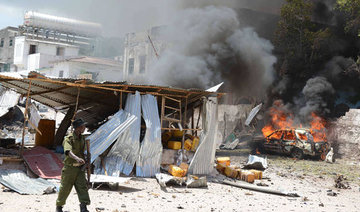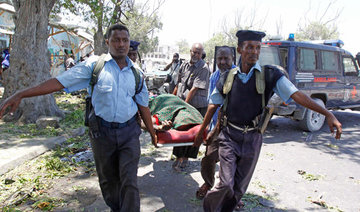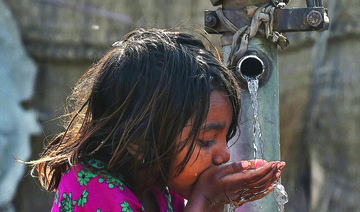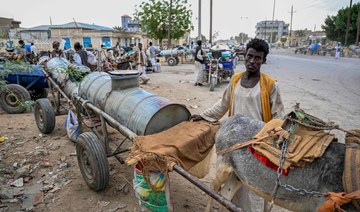MOGADISHU: Somalia’s allies sent planes carrying medical supplies and doctors Tuesday, while the diaspora rallied to donate blood to help the country cope with the crushing aftermath of its worst ever bombing.
At least 276 people were killed and 300 injured on Saturday when a truck packed with explosives blew up in a busy commercial district, according to the government, however medical sources suggest the death toll could be over 300.
The disaster quickly overwhelmed the fragile health system of a country which has experienced nearly three decades of civil war and anarchy and is heavily dependent on foreign aid.
Planes from the US, Kenya and Qatar landed in Mogadishu on Tuesday.
“We have received today three aircrafts carrying medical supplies from the USA, Qatar and Kenya and apart from the one from USA government, the other two will carry back wounded people, about 35 victims,” said Mogadishu Mayor Tabid Abdi Mohammed.
On Monday, Turkey — a leading donor and investor in Somalia — ferried 35 wounded people to Ankara after its Health Minister Ahmet Demircan accompanied a plane carrying supplies, medics and disaster experts to the country.
Djibouti’s Health Minister Djama Elmi Okieh accompanied a team of specialist doctors and paramedics in a military aircraft to assist the wounded, according to state media.
On Tuesday, Kenyan Foreign Minister Amina Mohammed announced that the country would evacuate 31 injured Somalis for specialized treatment in Nairobi, and send 11 tons of medicine to the neighboring country.
In addition the Kenyan Red Cross launched a fundraising drive for victims of the attack.
“This is a very good sign, for the fact that we are getting medical assistance because we cannot handle such a massive disaster,” said Dr. Abdukadir Hajji Adem who runs Mogadishu’s only free ambulance service AMIN.
According to his count the death toll stood at 302. Death tolls are notoriously difficult to establish in Mogadishu, with families often quickly taking victims away to be buried.
“When the tragedy happened, the telephone network was down and our coordination was very bad because we don’t have walkie talkies, our equipment is insufficient to deal with a terrible incident like the one,” he said.
A GoFundMe page started by a Somali living in Sweden has raised €15,000 ($17,000) for the ambulance service — which operates a fleet of 10 second-hand vehicles — in only two days.
Somalia’s years of conflict, which began when Siad Barre’s military regime collapsed in 1991, has created a diaspora of about two million people.
The largest population of Somalis abroad is in Kenya, where hundreds lined up Wednesday in Nairobi’s Eastleigh neighborhood — often dubbed Little Mogadishu — to donate blood to be airlifted to their countrymen.
“Quite a number of the casualties what they need at the moment is blood ... the turnout is massive, we have a lot of donors, we are really overwhelmed,” said Abdi Nasir Dahir of Kenya’s national blood transfusion services.
The blast occurred in Hodan, destroying some 20 buildings in a bustling commercial district, leaving scores of victims burned beyond recognition.
Several experts said the truck was probably carrying at least 500 kg of explosives.
There has been no immediate claim of responsibility, but the Al-Shabab, a militant group aligned with Al-Qaeda, carries out regular suicide bombings in Mogadishu in its bid to overthrow Somalia’s internationally-backed government.
The group has a history of not claiming attacks whose scale provokes massive public outrage.
Already more than 100 unidentified people have been buried who were burned beyond recognition.
“The government exhausted every effort to identify these dead bodies ... but it became so difficult that it decided to bury them all together,” said local government official Muhidin Ali.
The devastating attack is a blow to Somalia’s fledgling government, coming eight months after President Mohamed Abdullahi Mohammed was elected to great fanfare in a limited voting process that was nevertheless seen as the most democratic yet in the notorious failed state.
He came into office declaring war on Al-Shabab, which has carried out regular attacks on Mogadishu since African Union and Somali troops drove them out of the capital in 2011.
According to the Nairobi-based Sahan thinktank, at least 723 people were killed and over 1,000 injured in bomb attacks in 2016 in Somalia.
Medical aid rushed to stricken Somalia after bombing
Medical aid rushed to stricken Somalia after bombing
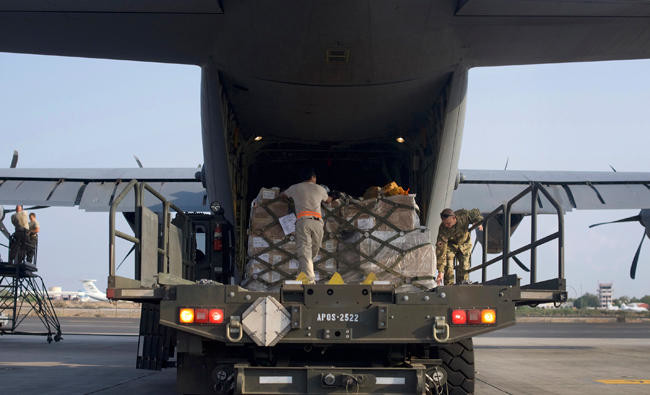
Frankly Speaking: Can Lebanon ever have an ‘independent’ president?

- Ziad Hayek explains how he would fix the economy and break the political deadlock without Hezbollah’s support
- Presidential candidate weighs in on relations with the GCC bloc and whether a war with Israel is now inevitable
DUBAI: People familiar with Lebanon’s sectarian politics and power camps are typically skeptical about the likelihood and success of a truly independent candidate for the presidency — a position that has been vacant since October 2022.
However, Ziad Hayek, who claims to be an independent, says that the current parliamentary climate makes it possible to stand successfully and work effectively as a president representing none of the main political camps.
“The makeup of parliament for the first time in Lebanon is such that it allows us to do that,” said Hayek during an appearance on the Arab News current affairs program “Frankly Speaking.”
“The two general factions that are defined by either pro-Hezbollah or against Hezbollah and pro-Western camp or pro-East, these two larger factions are almost equally divided in parliament. And neither side is able or has been able for the past year and a half to get their candidate elected.
“And so I think that they need to come to terms with that situation. They need to focus on finding a president, a candidate that they can both feel comfortable with, and yet does not belong to either side.”
Challenged by “Frankly Speaking” host Katie Jensen on whether he really stands a chance of success without aligning himself with Hezbollah, Hayek said only an independent could help the country to break with the past.
“The focus that I have today is on making sure that I’m an acceptable candidate to all sides, because all factions have to be comfortable, and I wouldn’t want to be the candidate of either side. That’s why I’m running as an independent candidate,” he said.
“At the end of the day, we are not going to move Lebanon from the mud … unless we really get to understand the issues that all the parties face and air concerns and allay their concerns. So that applies to Hezbollah and it applies to all the other parties.”
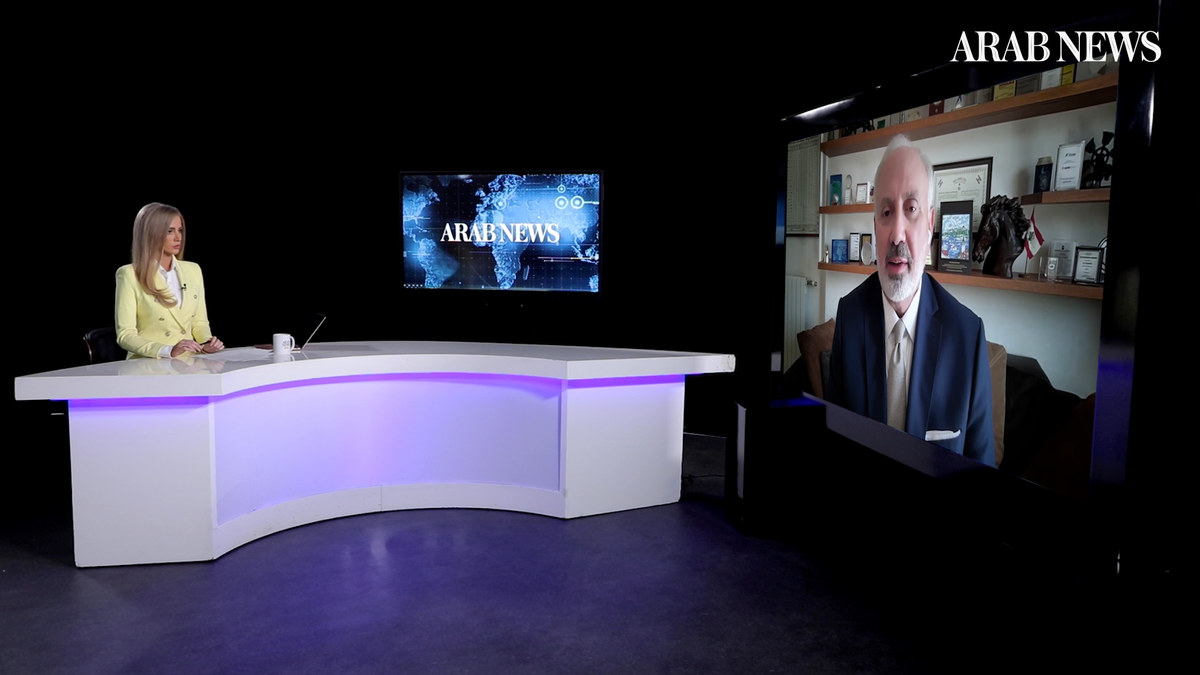
Hezbollah has significant support among the Shiite population of Lebanon and even among many Maronite Christians, including presidential contender Gebran Bassil — the son-in-law of former President Michel Aoun, who took office thanks to his backing of Hezbollah.
Given the political clout of Hezbollah and Lebanon’s other big parties, can an independent hope to break through? Hayek says it is precisely because these big hitters have consistently failed to get their own candidates elected that an independent can break the deadlock.
“Of course, I do understand that Hezbollah has an influential role in this election,” he said. “I don’t discount that. But so do other parties. Hezbollah has not been able to get its candidate elected so far, and neither have the other parties.
“Yes, I do understand that people may think that my position is a bit unrealistic simply because Lebanon has not had this type of situation before. But I think it is in this situation that we have the opportunity to break away from the past and look to Lebanon’s future in a different way.”
Hayek is not new to Lebanese politics. In 2006, he joined the government of Prime Minister Fouad Siniora, becoming secretary general of the Republic of Lebanon’s High Council for Privatization and PPP until he was nominated to be president of the World Bank in 2019.
Having witnessed the devastating 2006 war, the financial crash of late 2019, the economic toll of the pandemic, the destruction of the Beirut port blast of Aug. 4, 2020, the government’s paralysis since October 2022, and now a low-intensity conflict on Lebanon’s southern border with Israel, one has to wonder: Why on earth would he want to be president?
“I want this job because I really feel that this place is one of the best countries in the world with so much potential,” he said. “And yet the political discourse in it has been going in the wrong direction. And I would like to change that.
“I’m hoping to be able to change the political dialogue, focus more on socio-economic matters, how to develop the country, how to develop its economy, rather than continuing the conversation that usually takes place about ‘this faction wants this guy’ and ‘this faction wants that guy.’
“None of these candidates have presented any program, any vision for the future. So I would like to change the way that the Lebanese public looks at politics in general, and focus on policies.”
Bridging the political divide in Lebanon’s multi-confessional system that emerged after the civil war would be a tall order for any experienced politician with a party machine to back them up.
Hayek is confident that his background in finance, helping governments balance their books and facilitate reform, makes him ideally suited to getting even the bitterest of rivals to work together for the public good.
“I have made a career of being able to work with people that everybody else said: ‘No, you cannot work with this guy. You cannot work with this group,’” he said.
“The Lebanese public in general is really yearning for somebody that can address the needs that it has and the daily needs of the Lebanese citizen, not just the geopolitics of America and Iran and all this conversation that really leads nowhere at the end of the day for the common person on the street.”
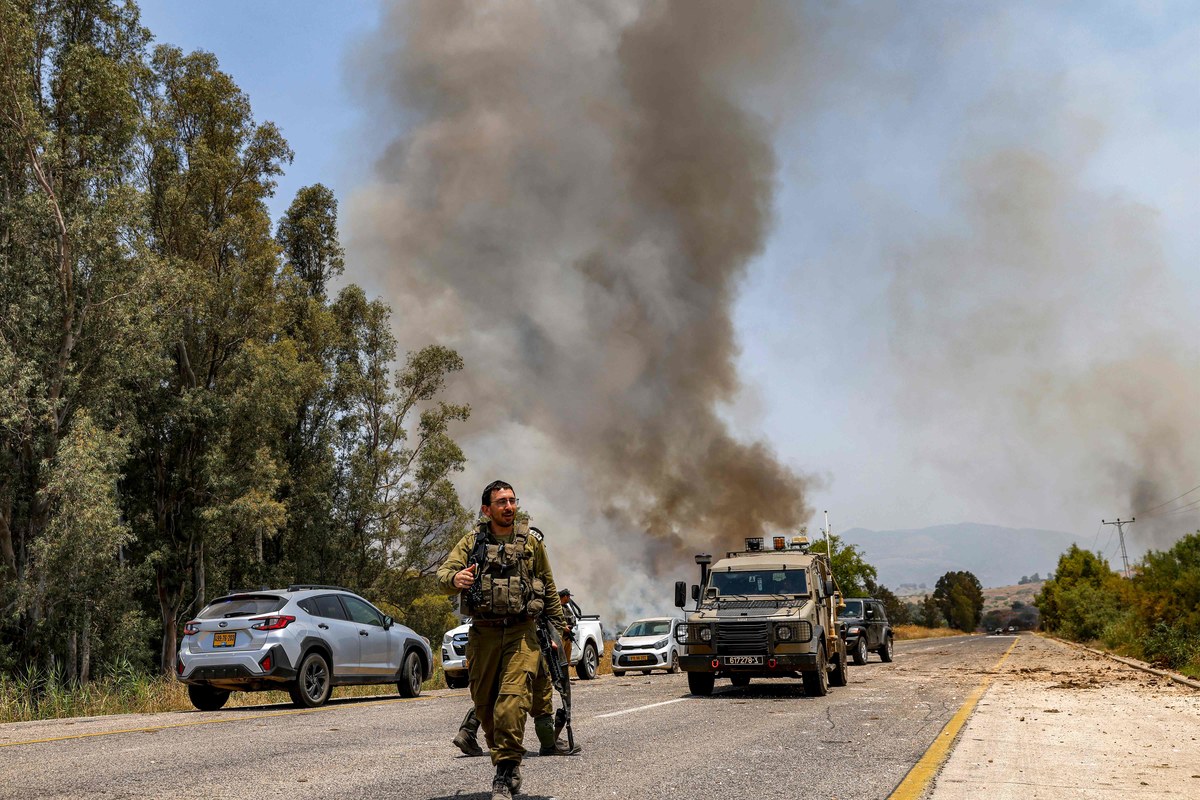
Like it or not, Lebanon’s destiny is tied up in geopolitics. In fact, Hezbollah’s Iranian backers and their Israeli rivals have turned the country into a battlefield in their ongoing shadow war.
Since the Oct. 7 Hamas-led attack on southern Israel triggered the war in Gaza, Hezbollah has launched daily rocket and drone attacks against Israel’s northern territories to draw fire away from its Hamas allies.
Israel has retaliated with its own air and artillery strikes against southern Lebanon, leading to fears of an escalation that could drag the wider region into a major confrontation.
Asked whether a full-scale war can be averted, sparing Lebanon a devastating Israeli invasion it can ill afford to fight, Hayek said he was hopeful “cooler heads will eventually prevail.”
“Both the Israelis and the Lebanese, including Hezbollah, have to realize, all of us, that these wars lead nowhere,” he said. “It’s just destruction on both sides. And at the end of the day, this conflict has gone on for decades. And all these wars end with some compromise and some agreement on a ceasefire that lasts for a certain period of time.
“We need to move towards finding a lasting peace. And the makings of that were already starting to happen when Lebanon reached an agreement on the delineation of the maritime borders with Israel. There was work that was continuing, helped along by the Americans.
“Unfortunately, this Gaza situation came up and changed things. But I think when the dust settles, we do need to go back to working on the task of making sure that we build a lasting peace.
“For now, it is a terrible situation. There is no doubt about it. I think that cooler heads will eventually prevail as they always do in every conflict. And we will see some agreement between the parties.”
Nevertheless, the rhetoric from Israeli Prime Minister Benjamin Netanyahu and Hezbollah leader Hassan Nasrallah has continued to grow more hostile and the spate of cross-border attack more deadly, leaving some to conclude a full-scale war seems inevitable.
“Israel knows that it is in its best interest not to engage in a war in Lebanon that it cannot win,” said Hayek. “Lebanon is not Gaza. It’s going to be a lot more difficult. It’s something that Israel has experienced in the past, and I don’t think the Israelis wish to escalate the war in Lebanon.
“But continuing to play with fire, tit for tat and all of that, is not helpful because we are a hair trigger away from an escalation. I mean, any day there can be a strike that goes wrong beyond the normally accepted, currently accepted type of trading fire between the two parties.
“And such a situation can lead to a very fast escalation that may draw even regional powers into the equation. And I think that nobody wants that, really.”
Even if the region is spared a major war, Lebanon still has to contend with a broken economy, rampant corruption, shattered infrastructure, mass unemployment, extreme poverty, and a generation of young people who have fled abroad.
If he becomes president, how would Hayek go about untangling such a colossal mess?

“I have presented a plan specifically for Lebanon to get out of its financial crisis,” he said. “It is built on converting the bank deposits into tradeable CDs (certificates of deposit) on the Beirut Stock Exchange to enable the capital markets to come back to life again.
“It involves using some of the gold reserves to create funds for social development and for economic development. It includes regaining the ability of the government not to raise taxes but to collect taxes in order to pay for the services it needs to deliver to the Lebanese public. So I do have some ideas.
“I think that the International Monetary Fund’s approval is very important because we do need the seal of approval of the IMF to regain the confidence of investors. But I think there are many ways to discuss with the IMF what could be acceptable to them as well as taking the Lebanese reality into consideration.”
Hayek also wants to see Lebanon revive its economic ties with the Gulf Cooperation Council bloc, allowing Lebanese companies to prosper from investment opportunities, in particular Saudi Arabia’s Vision 2030 agenda.
“The relationship with the GCC is crucial,” he said. “Those countries are the hosts of hundreds of thousands, or tens of thousands of Lebanese that are working there. So they are very important currently to our economy with the remittances of these people.
“But also, of course, the Lebanese are contributing to the growth and development that is happening in the region because the Lebanese working there are highly educated, highly skilled, able to contribute in a big way.
“This mutual relationship of benefits needs to be strengthened. I think that with Vision 2030 in Saudi Arabia and other plans in the UAE and other countries, these are big opportunities for the Lebanese, big opportunities for Lebanon to solidify its relationships with those countries and governments and projects and as well as for them to see that they already know that Lebanon has much to offer to contribute towards their success.”
Afghan Taliban government says to attend third round of UN-hosted Doha talks

- Mujahid told local media on Sunday the decision had been made to send a delegation, the members of which would be announced later, because it was deemed “beneficial to Afghanistan”
KABUL: Taliban authorities will attend the third round of United Nations-hosted talks on Afghanistan in the Qatari capital, a government spokesman told AFP on Sunday, after snubbing an invitation to the previous round.
“A delegation of the Islamic Emirate will participate in the coming Doha conference. They will represent Afghanistan there and express Afghanistan’s position,” Taliban government spokesman Zabihullah Mujahid said of the talks, which are scheduled to start June 30.
The participation of the Taliban authorities in the two-day conference of special envoys on Afghanistan had been in doubt after they were not included in the first round and then refused an invitation to the second round in February.
Mujahid told local media on Sunday the decision had been made to send a delegation, the members of which would be announced later, because it was deemed “beneficial to Afghanistan”.
Hamas response to Gaza ceasefire proposal ‘consistent’ with principles of US plan, leader says

- Egypt and Qatar said on June 11 that they had received a response from the Palestinian groups to the US plan
CAIRO: Hamas’ response to the latest Gaza ceasefire proposal is consistent with the principles put forward in US President Joe Biden’s plan, the group’s Qatar-based leader Ismail Haniyeh said in a televised speech on the occasion of the Islamic Eid Al-Adha on Sunday.
“Hamas and the (Palestinian) groups are ready for a comprehensive deal which entails a ceasefire, withdrawal from the strip, the reconstruction of what was destroyed and a comprehensive swap deal,” Haniyeh said, referring to the exchange of Israeli hostages for Palestinian prisoners.
On May 31, Biden laid out what he called a “three-phase” Israeli proposal that would include negotiations for a permanent ceasefire in Gaza as well as phased exchanges of Israeli hostages for Palestinian prisoners held in Israel.
Egypt and Qatar — which along with the United States have been mediating between Hamas and Israel — said on June 11 that they had received a response from the Palestinian groups to the US plan, without giving further details.
While Israel said Hamas rejected key elements of the US plan, a senior Hamas leader said that the changes the group requested were “not significant”.
Red Sea crisis intensifies economic strain on Yemenis ahead of Eid

- Sales have decreased by 80 percent
- Over 1.2 million civil servants have not received salaries in eight years, and hundreds of thousands have lost their jobs
DUBAI: Yemen, suffering from nearly a decade of civil war, now faces an additional challenge: a crippled economy further strained by the escalating crisis in the Red Sea.
Market vendors in Sanaa’s Old City, the Al-Melh, claim that sales have decreased by 80 percent, according to a report by Chinese news agency Xinhua.
Shopkeepers attribute this decline to recent increases in sea shipping costs, which have driven up wholesale prices.
This situation reflects the broader economic crisis in Yemen, where rising sea shipping costs have increased prices across the board, making basic Eid essentials unaffordable for many.
To help ease financial strain, an exhibition was organized in Al-Sabeen Park, where families were able to sell homemade goods.
Despite these efforts, Yemen’s economic problems persist. According to the UN, the decade-long war has pushed millions into poverty. Over 1.2 million civil servants have not received salaries in eight years, and hundreds of thousands have lost their jobs. The Norwegian Refugee Council reports that four out of five Yemenis face poverty, and over 18 million people urgently need humanitarian aid.
Water crisis batters war-torn Sudan as temperatures soar

- The country at large, despite its many water sources including the mighty Nile River, is no stranger to water scarcity
- This summer, the mercury is expected to continue rising until the rainy season hits in August
PORT SUDAN, Sudan: War, climate change and man-made shortages have brought Sudan — a nation already facing a litany of horrors — to the shores of a water crisis.
“Since the war began, two of my children have walked 14 kilometers (nine miles) every day to get water for the family,” Issa, a father of seven, said from North Darfur state.
In the blistering sun, as temperatures climb past 40 degrees Celsius (104 degrees Fahrenheit), Issa’s family — along with 65,000 other residents of the Sortoni displacement camp — suffer the weight of the war between Sudan’s army and the paramilitary Rapid Support Forces (RSF).
When the first shots rang out more than a year ago, most foreign aid groups — including the one operating Sortoni’s local water station — could no longer operate. Residents were left to fend for themselves.
The country at large, despite its many water sources including the mighty Nile River, is no stranger to water scarcity.
Even before the war, a quarter of the population had to walk more than 50 minutes to fetch water, according to the United Nations.
Now, from the western deserts of Darfur, through the fertile Nile Valley and all the way to the Red Sea coast, a water crisis has hit 48 million war-weary Sudanese who the US ambassador to the United Nations on Friday said are already facing “the largest humanitarian crisis on the face of the planet.”
Around 110 kilometers east of Sortoni, deadly clashes in North Darfur’s capital of El-Fasher, besieged by RSF, threaten water access for more than 800,000 civilians.
Medical charity Doctors Without Borders (MSF) on Friday said fighting in El-Fasher had killed at least 226.
Just outside the city, fighting over the Golo water reservoir “risks cutting off safe and adequate water for about 270,000 people,” the UN children’s agency UNICEF has warned.
Access to water and other scarce resources has long been a source of conflict in Sudan.
The UN Security Council on Thursday demanded that the siege of El-Fasher end.
If it goes on, hundreds of thousands more people who rely on the area’s groundwater will go without.
“The water is there, but it’s more than 60 meters (66 yards) deep, deeper than a hand-pump can go,” according to a European diplomat with years of experience in Sudan’s water sector.
“If the RSF doesn’t allow fuel to go in, the water stations will stop working,” he said, requesting anonymity because the diplomat was not authorized to speak to media.
“For a large part of the population, there will simply be no water.”
Already in the nearby village of Shaqra, where 40,000 people have sought shelter, “people stand in lines 300 meters long to get drinking water,” said Adam Rijal, spokesperson for the civilian-led General Coordination for Displaced Persons and Refugees in Darfur.
In photos he sent to AFP, some women and children can be seen huddled under the shade of lonely acacia trees, while most swelter in the blazing sun, waiting their turn.
Sudan is hard-hit by climate change, and “you see it most clearly in the increase in temperature and rainfall intensity,” the diplomat said.
This summer, the mercury is expected to continue rising until the rainy season hits in August, bringing with it torrential floods that kill dozens every year.
The capital Khartoum sits at the legendary meeting point of the Blue Nile and White Nile rivers — yet its people are parched.
The Soba water station, which supplies water to much of the capital, “has been out of service since the war began,” said a volunteer from the local resistance committee, one of hundreds of grassroots groups coordinating wartime aid.
People have since been buying untreated “water off of animal-drawn carts, which they can hardly afford and exposes them to diseases,” he said, requesting anonymity for fear of reprisal.
Entire neighborhoods of Khartoum North “have gone without drinking water for a year,” another local volunteer said, requesting to be identified only by his first name, Salah.
“People wanted to stay in their homes, even through the fighting, but they couldn’t last without water,” Salah said.
Hundreds of thousands have fled the fighting eastward, many to the de facto capital of Port Sudan on the Red Sea — itself facing a “huge water issue” that will only get “worse in the summer months,” resident Al-Sadek Hussein worries.
The city depends on only one inadequate reservoir for its water supply.
Here, too, citizens rely on horse- and donkey-drawn carts to deliver water, using “tools that need to be monitored and controlled to prevent contamination,” public health expert Taha Taher said.
“But with all the displacement, of course this doesn’t happen,” he said.
Between April 2023 and March 2024, the health ministry recorded nearly 11,000 cases of cholera — a disease endemic to Sudan, “but not like this” when it has become “year-round,” the European diplomat said.
The outbreak comes with the majority of Sudan’s hospitals shut down and the United States warning on Friday that a famine of historic global proportions could unfold without urgent action.
“Health care has collapsed, people are drinking dirty water, they are hungry and will get hungrier, which will kill many, many more,” the diplomat said.


